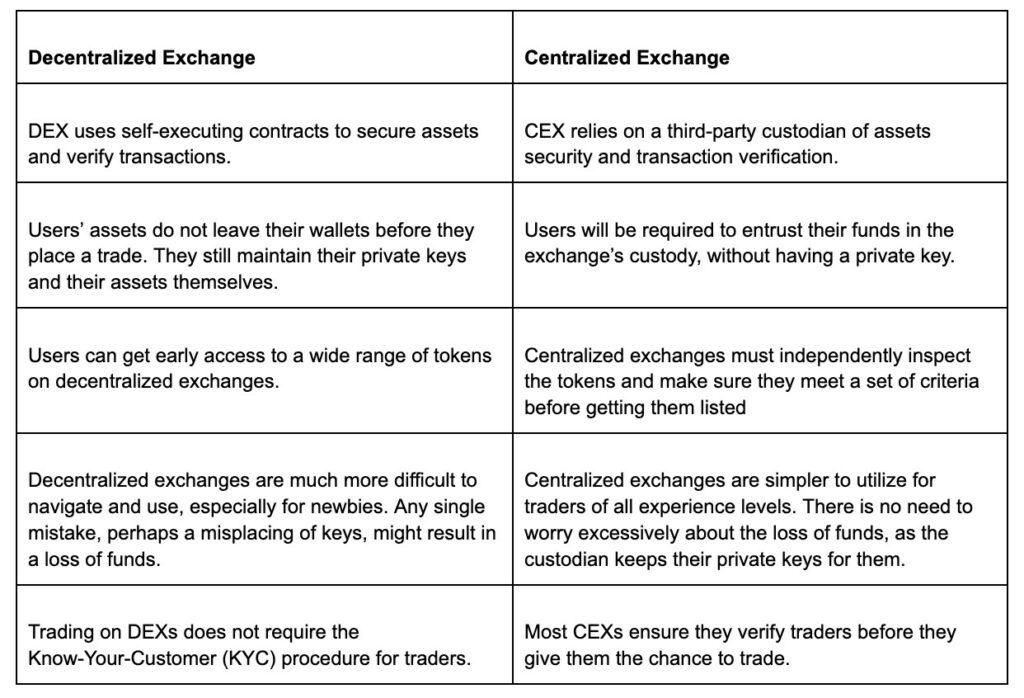Cryptocurrencies, just like traditional currencies, are bound to be exchanged from one party to another–this is what makes them valuable. You don’t just accumulate or have a cryptocurrency without anything happening with it, such as an exchange in value.
So, since digital assets primarily exist online–without having any physical form–there must be some kinds of online-based platforms that make all the trade and transactions possible. This is where cryptocurrency exchanges come in. Exchanges allow users to store, exchange, trade, and utilize their cryptocurrency assets at any point in time.
There are two major types of cryptocurrency exchange: centralized (CEX) and decentralized (DEX). Although with similar purposes of allowing a wide range of crypto trades, these two kinds of crypto exchanges operate in different manners.
While centralized exchanges (CEXs) are easy to use and less secure, decentralized exchanges can be complicated to use but are considerably secure.
As a result, in this article, we are going to discuss majorly on decentralized exchanges, how it works, some popular examples, and how it differs from their centralized counterparts.
What Does a Decentralized Exchange Mean?
A decentralized exchange is a kind of crypto platform that allows individuals and traders to directly manage and have control over their crypto assets. Unlike centralized exchanges that rely on third parties referred to as “custodians” to keep users’ crypto assets, decentralized exchanges wholly rely on smart contracts to secure users’ funds and automatically validate transactions at the user’s request.
They have full control over their funds because they are still holding the private keys that contain all their cryptocurrencies. A private key is a form of high-tech encryption that gives users entry to their digital assets. As a result, they can easily manage their funds and utilize them at any moment they feel like, with little to no restrictions.
Traders are not required to transfer their crypto assets from their wallets to the exchange, they rather maintain complete control over their cryptocurrency in their own wallets. It should, however, be noted that DEXs are designed for experienced crypto users because smart contracts are rules-based and can eventually lead to loss of funds if proper care is not taken.
Some Decentralized Exchanges (DEXs) to Check Out
There are hundreds of decentralized cryptocurrency exchanges available right now, but the following are a few of the most reliable and well-known ones where you may safely place your crypto trades.
● MelegaSwap
MelegaSwap is a decentralized automated market maker (AMM) exchange built on Binance Smart Chain (BSC), offering friendly trading and improved project support. Users of MelegaSwap can trade directly from their cryptocurrency wallets without having to transfer any funds.
One of the main reasons MelegaSwap is currently one of the top decentralized exchanges is that it offers far lower trading fees than other top exchanges currently in operation, with the ability to earn money in a variety of ways, including farms, pools, and fees.
The MARCO native token from Melega provides its holders with fascinating new opportunities. One of the advantages for holders is the chance to receive free tokens every week from the best projects if they stake MARCO on MelegaSwap.
● Uniswap
Uniswap is a leading Ethereum-based decentralized exchange that enables P2P exchanges protected with smart contracts. The platform, which was established in 2018, provides an automated liquidity protocol that is backed by a fixed product formula and implemented in a set of Ethereum blockchain-based smart contracts that cannot be upgraded. It also supports trading across some other popular blockchain networks.
Similar to many other decentralized cryptocurrency exchanges, Uniswap eradicates the need for trusted intermediates, prioritizing decentralization, censorship resistance, and security. Uniswap has a native crypto token named after the exchange’s name, with the symbol UNI.
Uniswap exchange supports a few other popular exchanges aside from Ethereum. Some of them are Polygon, Optimism, Arbitrum, and Celo.
● Pancakeswap
Pancakeswap is one of the most popular decentralized exchanges for trading BEP20 tokens on the Binance Smart Chain. This exchange utilizes an automated market maker (AMM) architecture that allows users to trade against a liquidity pool. Users contribute to the pool in exchange for liquidity provider (or LP) tokens. Therefore, they can recoup their share and a fraction of the trading commissions using those tokens.
The exchange platform also has a native token, “CAKE”, that allows users to take part in a yield farm where they can obtain a yield on their LP tokens.
● Balancer
The Balancer is an automated market maker (AMM) decentralized exchange based on the Ethereum network, that allows users to benefit from several features to create Defi products. This exchange enables efficient trading by pooling crowdsourced liquidity from investor portfolios and using its Smart Order Router to find traders the best available price.
Differences Between Decentralized Exchanges (DEX) and Centralized Exchanges (CEX)
Although they offer similar services of buying and selling cryptocurrencies, centralized exchanges and decentralized exchanges operate in slightly different manners. Let’s check out their basic differences.
How Do You Choose the Most Suitable Exchange?
Choosing the most suitable type of cryptocurrency exchange depends on the user’s preferences, the type of trade they want to carry out, and some other factors. For instance, a user that wants to get into a crypto project early enough would definitely need to use a DEX, as most of the newly released tokens are always initially launched on DEXs before they are made available CEXs. Similarly, a trader who wants anonymity on his trades or wants direct control over his funds and all his actions might also want to use a decentralized exchange, rather than a CEX.
On the other hand, a centralized exchange can be the best option for a trader who is not well-versed in how decentralized protocol or smart contracts operate. Centralized exchanges are easier to use, with little possibility of losing one’s funds, compared to a slight mistake in how one handles transactions on a DEX.
Closing Thoughts
We hope this content has explained what you need to know about decentralized and centralized exchanges and help you decide on the one to choose whenever the need arises. It should now be noted that regardless of the type of exchange you want to use for your trades, being cautious is very important. For instance, sending crypto assets to the wrong public address might result in a permanent loss of money. Even if this occurs on a centralized exchange, the funds might not be refundable.


































